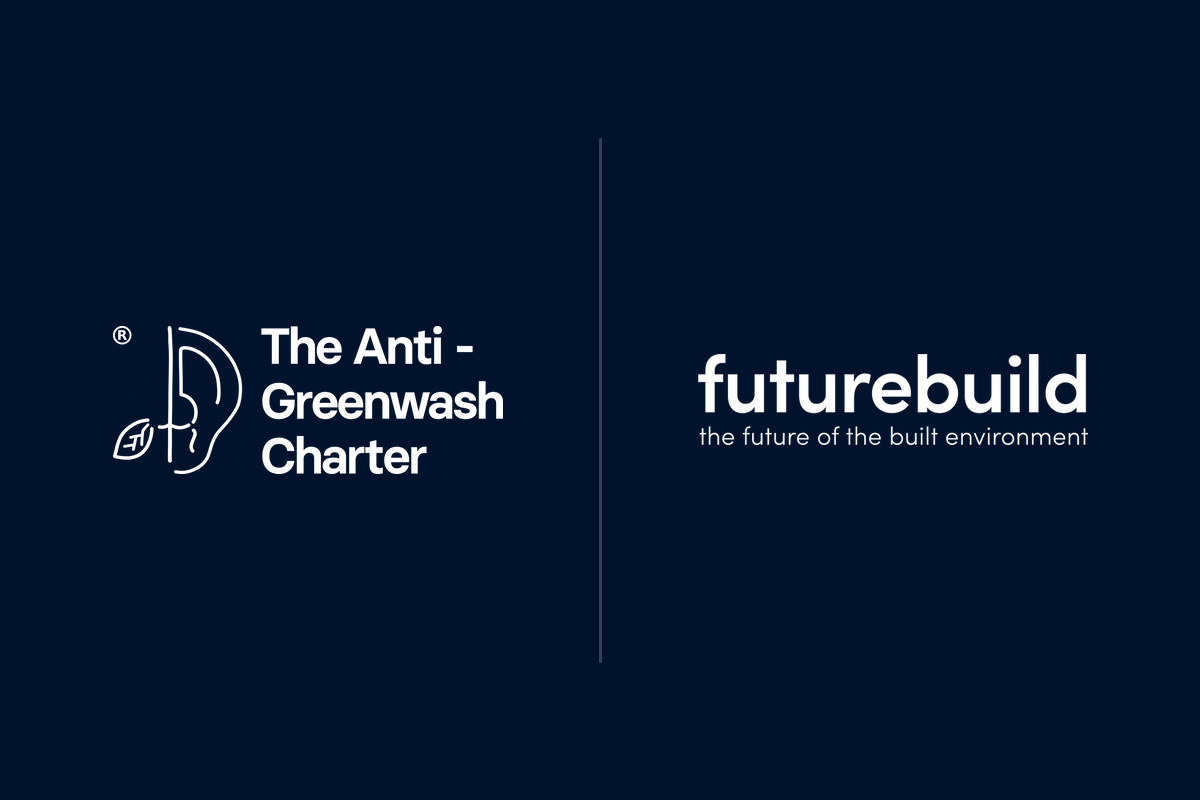
Greenwashing in the Built Environment – Unravelling Truths and Mitigating Risks.
Date: Oct 2023
Read time: 5 mins
Author: Charlotte Waters

In September 2023, we hosted a webinar with Futurebuild* at which we presented the findings of the recent research undertaken into the opinions of people in the built environment on greenwashing.
Greenwashing is clearly a topic that people want to know more about as over 1,000 people registered and, surprisingly for a webinar, around half turned up! Obviously the Futurebuild audience is an engaged one.
You can rewatch the presentation here but we’ll review the key points for anyone who would prefer to read it.
You can also view the polls that were taken in the webinar here.
The webinar was based around our recent survey report – ‘Greenwashing – what’s true, what’s not, and does it matter?’ – which includes data on how greenwashing impacts the industry reputationally and commercially, and how it stands in the way of achieving valid sustainability goals.
The survey, of 420 businesses, sheds light on green claims and key findings include:
- Nearly 90% said that greenwashing is a problem.
- 74% say it can lead to loss of reputation.
- When asked what impression greenwashing can give, over 72% see it as dishonest and unethical.
- 58% would remove a supplier from the supply chain if they are accused of or found guilty of greenwashing.
- 72% would be prepared to pay a higher price for a product with verified green claims.
Introduction
The issue of greenwashing has gained significant attention in recent times, as sustainability and environmental concerns become increasingly critical for both consumers and businesses. In the survey, nearly 90% of respondents acknowledged greenwashing as a prevalent problem in various industries, with concerns about its dishonesty, unethical practices, and cost-driven motives.
This summary will delve into the survey’s findings, examining how greenwashing affects organisations across the built environment supply chain, its diverse manifestations, the impact of terminology, and why addressing it is crucial.
The Prevalence of Greenwashing
Greenwashing is pervasive in marketing materials and bid documentation, though to a lesser extent in the latter. It appears that companies tend to embellish their sustainability efforts to attract prospects, but these claims may not align with their actual practices.
Furthermore, visual elements such as imagery and colour choices often create misleading perceptions about an organization’s environmental commitments.
Half of the respondents reported encountering face-to-face encounters where they were presented with more positive information than could be verified, raising questions about trust and transparency.
Inconsistencies and Suspicious Phrases
The survey reveals that inconsistencies exist across different departments within organizations. Four in ten respondents reported hearing varying claims from different sources within the same organization. This may indicate poor communication governance or a lack of verified and defined sustainability claims.
Suspicious phrases like ‘offsetting,’ ‘environmentally friendly,’ ‘carbon neutral,’ and ‘sustainable practices’ were identified, casting doubt on their authenticity.
Without standardized definitions and publicly available explanations, the interpretation of such terms varies widely, highlighting the need for clarity in communication.
Why Greenwashing Matters
The consequences of greenwashing are far-reaching. It distracts from the goal of achieving net-zero emissions and securing a sustainable future for generations to come.
Customers need accurate information to make informed choices, supporting companies genuinely committed to positive change. Conversely, greenwashing erodes trust and hinders those genuinely striving for sustainability.
For businesses, it carries severe commercial implications, including damage to reputation, strained relationships, potential loss of business, and even financial penalties. A significant portion of respondents stated they would remove a supplier accused of greenwashing from their supply chain, emphasizing the importance of authenticity in business practices.
Verifying Claims
To protect themselves and provide truthful information, seven out of ten organizations are now more rigorous in requesting evidence to verify sustainability claims.
Nearly half of them seek a verified Green Claims Policy. If you don’t have one already, The Anti-Greenwash Charter can support you in creating one.
Clarity regarding verified claims and term definitions makes organisations more attractive to potential partners, as reported by nearly half of the respondents. While concerns about greenwashing haven’t substantially impacted the tendering process, the survey suggests that SMEs perform better in terms of claim accuracy compared to larger organizations.
Validating Sustainability Claims
To ensure robust claims, organisations are employing various approaches. These include referencing Environmental Product Definitions (50% of cases) and utilizing Lifecycle Assessments (46%). Additionally, many organizations have developed internal standards and processes for supply chain partners (nearly 4 in 10), or refer to the Product Environmental Footprint.
Some organisations employ independent sustainability consultants (25%) for added confidence, while others rely on BCorp certification (17%) to validate claims.
Notably, when asked if they would pay more for products with greater evidence of sustainability, nearly three-quarters of respondents expressed willingness to do so, indicating the growing importance of sustainability in purchasing decisions.
Greenhushing
Greenhushing, a term coined in response to greenwashing, emphasizes the importance of honesty and transparency.
Respondents stressed the need for organisations to acknowledge areas needing improvement, rather than claiming perfection. They recognised that immediate, substantial changes may not be feasible for most organizations and urged the celebration of smaller, genuine efforts and intentions for long-term sustainability.
This perspective encourages a shift away from solely applauding major changes that may not always represent the full picture.
Conclusion
The prevalence of greenwashing is a concerning issue that impacts organizations across various sectors, including the built environment.
Addressing this problem requires clear definitions of sustainability terms, transparent communication, and rigorous verification of claims. Businesses must recognize the far-reaching consequences of greenwashing, both in terms of reputation and commercial implications.
By fostering transparency and authenticity, organizations can build trust, support genuine sustainability efforts, and contribute to a more sustainable future.
* Futurebuild is an exhibition for the built environment which brings together more than 15,000 building industry influencers and decision-makers. It will take place from March 5th to March 7th London’s ExCeL. For more details and exhibitor inquiries, visit: https://www.futurebuild.co.uk